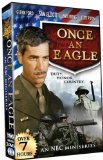| Reviews & Columns |
|
Reviews DVD TV on DVD Blu-ray 4K UHD International DVDs In Theaters Reviews by Studio Video Games Features Collector Series DVDs Easter Egg Database Interviews DVD Talk Radio Feature Articles Columns Anime Talk DVD Savant Horror DVDs The M.O.D. Squad Art House HD Talk Silent DVD
|
DVD Talk Forum |
|
|
| Resources |
|
DVD Price Search Customer Service #'s RCE Info Links |
|
Columns
|
|
|
Once An Eagle
"That once an eagle, stricken with an arrow, said, when he saw the fashion of the shaft, 'With our own feathers, not by others' hands, are we now smitten.'"
A potentially involving, epic-sized story of love and war, hampered only by its TV origins. Timeless Media Group, through the auspices of NBC Universal, has released Once an Eagle, the 1976 mini-series that made up one of four such long-format stories for NBC's Best Sellers series that year. With a soapy page-turning story (with serious undertones) based on the bestseller by Anton Myrer, and starring Sam Elliott, Cliff Potts, Darleen Carr, Glenn Ford, Amy Irving, along with a host of familiar film and TV faces, Once an Eagle can't help but hold one's attention. However, even at over six and a half hours running time, it can still feel choppy and coincidental, and the direction is visually (and at times, dramatically), uninspired. Old-school miniseries addicts, though (and I happily count myself among them), will still want this.
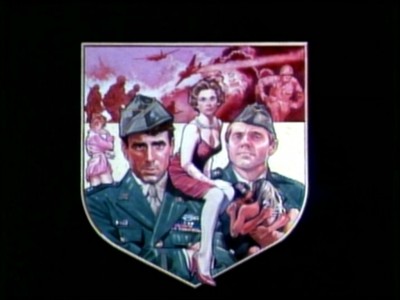
With a busy, event-filled running time of 540 minutes that covers two world wars, a complete synopsis of Once an Eagle wouldn't be possible here in the scope of this review--nor desirable. So just a brief outline of the major players and the story's themes will have to suffice. Structured as a flashback on the eve of a horrific battle campaign in the South Pacific during WWII, Once an Eagle jumps back to America's involvement in WWI, with the induction of Sam Damon (Sam Elliott) in the army. A principled young man, Damon won't take advantage of his hometown girl Celia (Jennifer Shaw) because he knows he's committed not to her, but to the service, nor will he forget the menace and debilitating fear instilled by his immediate superior officer, Merrick (Clu Gulager), a psychopath who uses the military to express his murderous impulses. Rising slowly up through the ranks, Damon impresses his commanding officer Colonel George Caldwell (Glenn Ford), eventually winning from him a battle commission for his cool-under-pressure, humane leadership qualities, and brave tactics behind enemy lines. It doesn't hurt, either, that Colonel Caldwell has a strong-willed daughter, Tommy (Darleen Carr), a nurse who hates the war, who might finally meet her match with the equally-stubborn Damon.
Slimy backroom manipulator Courtney Massengale (Cliff Potts), is the genetic opposite of Sam Damon. Utterly unscrupulous, with a single-minded mission to become a powerful leader in the U.S. military, "Court" will do anything to get ahead, including marrying socialite Emily Pawlfrey (Amy Irving)...even if he may not be all that enthusiastic about his husbandly duties. When he married Emily, it was for show, a necessary window-dressing for a career officer intent on presenting the "right" image. But when the reality of her loveless marriage finally sinks in with Emily, she goes disastrously off-course, taking random lovers and spiraling down into emotional collapse. Damon, on the other hand, has absolutely nothing of value to offer Tommy in her marriage except his love. However, Tommy soon finds out that Sam has two loves: her and the Army, and his dedication to staying a soldier, even after his horrible experiences in the trenches of WWI, will eventually threaten the very foundation of their marriage. For Damon sees it as his duty to stay in the Army to protect the service from the likes of killers such as Merrick, and incompetents like Courtney, who use the service for their own psychological and political purposes--at the detriment (and death) of the soldiers they command. Damon knows war is coming again, and his love of the service is predicated on doing his job well, regardless of what compensations in rank he may or may not receive--an idea the war-hating Tommy eventually comes to despise. When WWII finally does come, war-mongering Court and valiant protector Sam's paths will cross again, with devastating results.
SPOILERS WARNING!
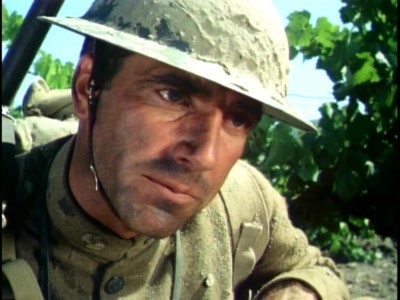
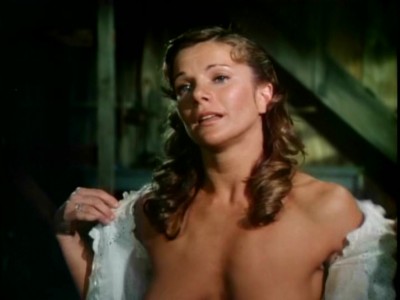
About a year and a half back, I wrote a review, with a brief rundown of the evolution of the TV miniseries, for Captains and the Kings, another one of the four mini-series featured on NBC's Best Sellers anthology in 1976. Since Once an Eagle was a part of the Best Sellers series, I'll include that prior run-down on one of television's most important innovations, before I discuss the film.
For anyone growing up in the 1970s who watched a lot of TV (we all did), the introduction of the "miniseries" was a notable development in TV programming. It's almost impossible today to try and convey that culture of a three-network-only TV environment to today's post-cable viewers, particularly with the absolutely dizzying array of media choices we now have. But suffice it to say, most Americans were fairly involved or at least knowledgeable about what was happening on the schedules over at CBS, ABC, and NBC...because they were the only games in town. So when the networks invented "big event" specials like the miniseries, it was rather an exciting concept to the average viewer. TV was always viewed as the smaller-budgeted, smaller-scale cousin of feature motion pictures (even though far more people watched TV than went to the movies by the 70s), so anything that approximated the big-budget, big-buzz spectaculars one could find at their local movie house, was a welcome novelty on TV.
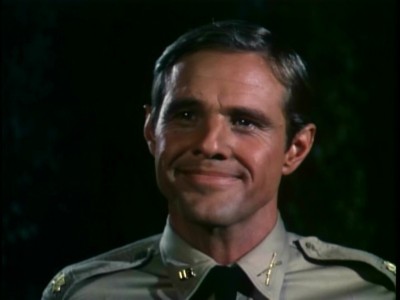
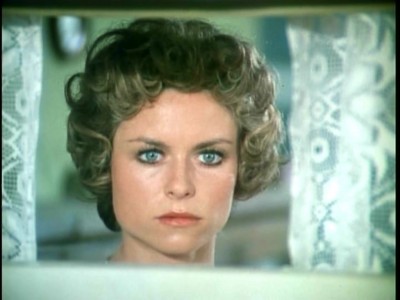
You can try and tell people (and some critics and reviewers who should know their TV history better) that ABC's blockbusters Rich Man, Poor Man and Roots weren't the very first one-two punch in the primetime TV miniseries genre, but don't bother; the mammoth ratings success of those two seminal TV events have all but obliterated the memory of the two miniseries that preceded them. (you can also debate the appearance of PBS-imported minis from Britain in that time-line). The very first "official" primetime network miniseries was NBC's four-night airing of Joseph Wambaugh's The Blue Knight in November of 1973 (almost three years before Rich Man, Poor Man), starring big-screen idol William Holden in one of his finest performances as over-the-hill beat cop, "Bumper" Morgan. NBC took a huge gamble with this programming move (would people have the patience to stick out the film, night after night, for four nights?), one that drew decent but not overwhelming ratings. ABC would validate the new programming concept in April of 1974 with its airing of Leon Uris' Holocaust courtroom drama, QB VII, the second official miniseries to air on American network TV, and a solid ratings winner. ABC, confident that they had hit on a limited format that could deliver ratings bumps during important "sweeps" periods (as well as being mindful of the relatively small but still impressive ratings' increases they saw with PBS stations importing British "minis" like Upstairs, Downstairs), went ahead with plans to adapt more novels for television, including the upcoming February, 1976 blockbuster, Rich Man, Poor Man (it's debatable to include ABC's Eleanor and Franklin, which premiered in January of 1976, because it only consisted of two parts - more like a two-part movie special rather than a true miniseries).
NBC was watching the success of QB VII, as well, and convinced that their own earlier foray into the miniseries format with The Blue Knight was a correct one, they rushed NBC's Best Sellers into production, an umbrella title for four of their planed miniseries for the 1976-1977 season (a fifth mini, The Moneychangers, would debut on NBC's The Big Event series in December). Captains and the Kings would lead off the year, followed by adaptations of Anton Myrer's Once an Eagle, Norman Bogner's Seventh Avenue, and Robert Ludlum's The Rhinemann Exchange. Airing on Thursday nights at 9:00pm, none of the minis debuting under the NBC's Best Sellers moniker garnered ratings anywhere near ABC's Rich Man, Poor Man (which had finished up 2nd for all shows in the 1975-1976 Nielsen's). Up against heavy hitter Hawaii Five-O on CBS (tied for 18th for the year), audiences were somewhat indifferent to these weekly minis, going so far as to support unlikely success The Tony Randall Show over on ABC, which even managed to crack the Nielsen Top Thirty at 29th for the year - something NBC's Best Sellers could not. Of all the minis presented under the NBC's Best Sellers umbrella, though, Captains and the Kings was the most successful, garnering a repeat airing in the spring (no doubt to capitalize on the enormous new publicity given to the miniseries genre with the success of Roots in January of 1977).
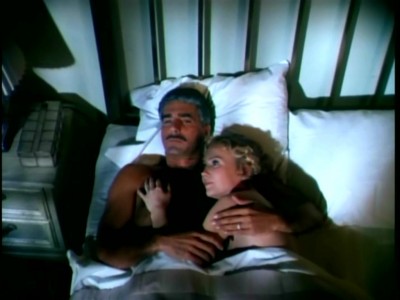
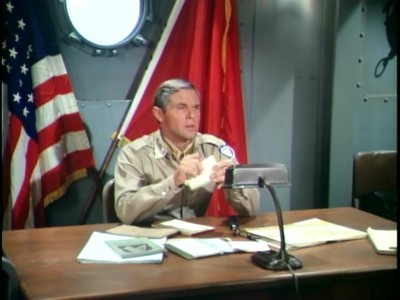
Which brings us to Once an Eagle. I haven't read the source novel (I did read Myrer's The Last Convertible, which was also made into a mini), but as I've written many times before (just this week alone, it seems), that shouldn't have any bearing on a filmed adaptation. Movies and novels are two separate aesthetic experiences, and Once an Eagle the film should be able to stand on its own merits outside of any comparisons to its literary inspiration. That being said, the inherent irony in a film like Once an Eagle is that the newly-minted miniseries format finally allowed a longer novel to be presented on screen fairly intact (at least in terms of plot), but that the medium's artistic conventions and economic realities ultimately worked against this largess of story development. We certainly get more of the novel's scenes dramatized here than we would in a 2-hour big-screen adaptation, but in the quick-pace, budget-conscious world of 1976 television, directorial innovation, evocative or symbolic editing, and expressive mise-en-scene, are largely absent. It's a trade-off that frequently afflicted many of the early minis, and it certainly holds true with Once an Eagle. Co-directed by TV vets E. W. Swackhamer and Richard Michaels (although you'd never know two entirely different hands were at the helm of this anonymous-looking film), Once an Eagle is as visually square and cookie-cutter as most TV was back in 1976, where the network motto was: keep it close, keep it in focus, and keep the heads in the center of the box. Editing is A-B-C (when it makes sense), and the production design is more clever than convincing in getting across period verisimilitude.
So as the parade of close-ups and two-shots unwinds before the viewer for over six hours, concentration comes to bear on the scripting and the performances, and this is where Once an Eagle works fairly well. Long-format serials like Once an Eagle can't help but draw in viewers already predisposed to enjoying multi-arc, generational stories such as this. Serious themes aside, it's the TV equivalent of a page-turner, where we find ourselves simply wanting to know what's going to happen next in this long, long saga. Part of the fun is knowing beforehand that we're going to invest a significant amount of our time with the story (Timeless Media gets that: they prominently display, "Over 7 Hours" in a starburst on the DVD's front cover), so we get that same initial pleasure surveying Once an Eagle's 540 minute run time, as we do when we hoist that huge hardcover onto our laps for a summer read at the beach. If it has that much to say, it must be interesting, we tell ourselves. And as with most minis from that period, source material was selected that emphasized themes that would appeal to viewers: namely sex, romance, and other melodramatic conventions. The networks weren't going to invest several nights of programming on dry academic or philosophical works...unless there was coarser, saleable material included to juice up the potential for ratings.
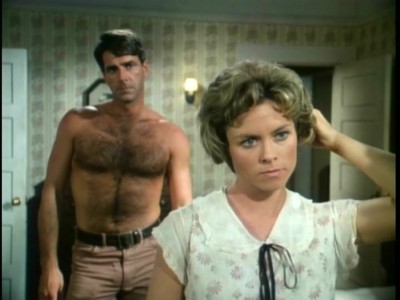
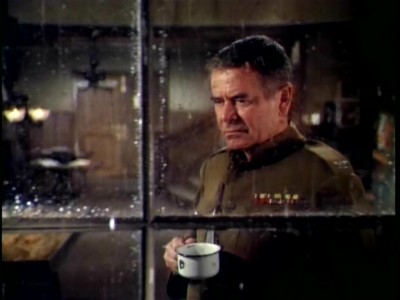
Once an Eagle certainly features those kinds of moments, from the beginning of the film, when buxom Jennifer Shaw strips down for Sam Elliott, offering herself to him without reservation (hot stuff in 1976), to Amy Irving's and babydoll-voiced Melanie Griffith's various sexual escapades, to Cliff Potts' perverted beating of a French prostitute because he's sexually dysfunctional (it's scripted very carefully to suggest without stating explicitly, due to the network's stringent Standards and Practice guidelines). Obviously the two central romances--with their sidelines of adultery--dominate the screen time, too. Anyone tuning into Once an Eagle back in '76 got a fairly liberal dose of passionate romance--and blatant carnality--on any given night of its run. But to its credit, Once an Eagle's script does try and delve, however clumsily, into more intellectual and philosophical territory, specifically with its meditations on the nature of war. The script (again, I can't say how much of producer Peter Fischer's screenplay follows the original novel) does a fairly decent job of exposing the callous brutality of institutionalized warfare embodied by either out-and-out killers or pencil-pushing gloryhounds, while holding up the virtues of soldiers and leaders like Sam Damon who abhor war...and yet know they must always be vigilant in preparation for such action. The film doesn't take any easy ways around the dichotomy of a character like Damon, who admits he loves the challenges of warfare, and yet understands the devastating impact, both emotionally and psychologically, that warfare has on the soldier, and that willingness to be unresolved again is to the film's credit. How much of that depth of thought is actually conveyed through the film's sometimes forced dramatics (and not from our own musings about the subject afterward) is open to discussion, but Once an Eagle does have something serious and weighty on its mind, and those themes aren't lost amid the various tumbles in beds.
Luckily for the film, an impressive roster of familiar faces (in 1976) are gathered here to enact the sometimes spottily-drawn or poorly-plotted characters. Certainly Sam Elliott is the anchor for the entire piece. 1976 was a big year for the then-emerging actor; in addition to this high-profile mini, he had the good luck to appear in the sleeper drive-in hit, Lifeguard, giving a sensitive portrayal in that well-received little film. Contrasting his laid-back, casual performance in that big-screen feature, here he's all determination and grit and integrity, and it's a performance that would be echoed in many other similar roles for the actor. It's a daunting challenge for an actor to "carry" a mini like Once an Eagle, and Elliott carries it off with authority and always the right choices, depending on what the scene calls for. Cliff Potts gets what arguably should be the showier role--the villain--but whether by scripting or design, his Court character comes off as one-dimensional with almost no shading. It works within the conventional schematic of the storyline--he's a rotter and we know it, so we wait for his comeuppance--but it unbalances Elliott's more carefully delineated character. Old pro Glenn Ford is effortlessly commanding, in that curiously soft-spoken way of his, as the wise Colonel, while relative newcomer Amy Irving scores big-time in the minis' most showy emotional scenes (she flips out with the best of them). Unfortunately for such a critical role, only Darleen Carr really disappoints here, failing to register much sympathy or heat with her flat, colorless turn (there is zero chemistry between her and Elliott). If I can't believe that Elliott would be emotionally tortured over her, and if I don't believe she's a worthy ideological foil for his well-drawn character, that puts a big hole in the middle of film that's hard to plug up. Fortunately, the large cast of pros (including Ralph Bellamy, Andrew Duggan, Lynda Day George, Robert Hogan, David Wayne, William Windom, Anthony Zerbe--just perfect here--James Cromwell, Dane Clark, David Huddleston, Albert Salmi, John Saxon, Barry Sullivan, a sexy Juliet Mills, Forrest Tucker, and Kent Smith, among many more) provides constant distraction from this fundamental flaw in Once an Eagle's production, while the script gives a little food for thought amid the melodramatics.
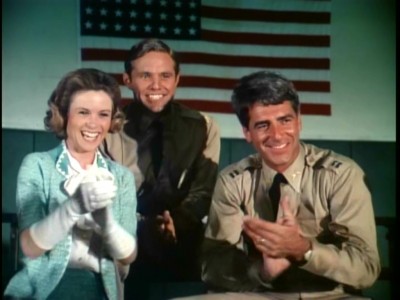
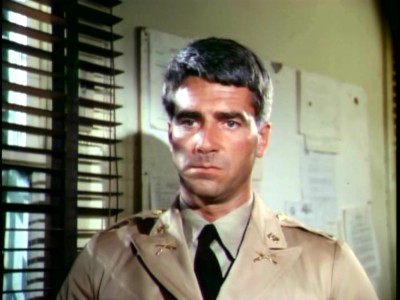
The DVD:
The Video:
The full-screen, 1.33:1 video transfer for Once an Eagle looks about on par with similar releases of material from this time period. This isn't a vintage Paramount restoration, but it isn't a video-duped second generation copy, either. Colors are reasonably accurate (if a little washed out and muddy), while the image is relatively sharp with a few expected screen anomalies like scratches and dirt.
The Audio:
Unfortunately, the Dolby Digital English split mono audio track is entirely too low in recording levels for the transfer, with the lack of subtitles or close-captions not helping at all.
The Extras:
Zero extras for Once an Eagle.
Final Thoughts:
Vintage TV miniseries fans have been waiting for this title for quite some time...and it's mostly worth the wait. I saw Once an Eagle back when it premiered, and as a kid, enjoyed its wartime heroics. Watching it now, I can appreciate its focus on melodramatic conventions in conjunction with some serious sidebars on the nature of war, and the men who fight them. Performances are quite good--although two of the leads failed to move me--with Sam Elliott single-handedly carrying the whole mini with his authoritative, sensitive performance. If you grew up on this sort of thing like I did, you're probably the best fit for this show, and for you, I recommend Once an Eagle.
Paul Mavis is an internationally published film and television historian, a member of the Online Film Critics Society, and the author of The Espionage Filmography.


|
| Popular Reviews |
| Sponsored Links |
|
|
| Sponsored Links |
|
|
| Release List | Reviews | Shop | Newsletter | Forum | DVD Giveaways | Blu-Ray | Advertise |
|
Copyright 2024 DVDTalk.com All Rights Reserved. Legal Info, Privacy Policy, Terms of Use,
Manage Preferences,
Your Privacy Choices | |||||||









